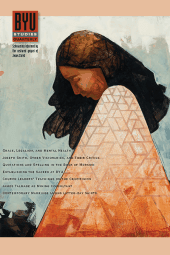Journal
Charity as an Exegetical Principle in the Book of Mormon

Title
Charity as an Exegetical Principle in the Book of Mormon
Publication Type
Journal Article
Year of Publication
2023
Authors
Stenson, Matthew Scott (Primary)
Journal
BYU Studies Quarterly
Pagination
83–114
Volume
62
Issue
1
Abstract
The eclectic Book of Mormon effectively collapses intellectual and sacred history. Anachronisms have drawn and do currently draw the attention of some Book of Mormon students and researchers. Nicholas J. Frederick, for instance, has written extensively on the presence of New Testament language in the largely pre–Christian Era record. Not all anachronisms are so extensive and involved as those Frederick traces. Some are minor and comparatively unimportant. However, there is a significant and pervasive conceptual anachronism that deserves critical attention. I speak of the primary narrators of the Book of Mormon using faith, hope, and charity (or love) as textual and exegetical principles. Divine love (and love of the divine and the divine within the human), or charity, was employed by the ancients, more or less, as a hermeneutic. But Christian charity as a fully articulated principle of exegesis began with Augustine (who was inspired by Ambrose) and continued for a thousand years or more until other less theologically oriented methods of interpretive reading emerged during the Renaissance and Reformation. ...the Book of Mormon, in a day of rigorous rationalistic approaches to interpretation, articulates the exegetical value of faith, hope, and especially charity. Nephi and Moroni both seem to understand that these three Christian virtues are principles of both composition and reception, if not also of comprehension and, ultimately, conversion and salvation.
In this essay, I do three things: (1) describe briefly and very broadly Augustine’s exegetical method (a method he creatively adopts and adapts from his reading of authors such as Virgil, Matthew, and Paul); (2) explain how two of the primary narrators of the Book of Mormon (Nephi and Moroni) describe the Nephite record’s eventual emergence as a good gift and marvelous miracle, even while paradoxically and anxiously anticipating its mixed Gentile reception due to these two narrators’ weaknesses and limitations as writers; and (3) demonstrate that faith, hope, and charity are principles not only of the Nephite record’s production but also of its Gentile reception, not altogether unlike what Augustine (and those he influenced for hundreds of years) advocates in his writings. It is not my purpose to recount the history of medieval or Augustinian exegesis but just to point out that the Nephite record interacts with an exegetical principle connected however tenuously to the once-prominent exegetical tradition.
Subject Keywords
Bibliographic Citation
Terms of use
Items in the BMC Archive are made publicly available for non-commercial, private use. Inclusion within the BMC Archive does not imply endorsement. Items do not represent the official views of The Church of Jesus Christ of Latter-day Saints or of Book of Mormon Central.